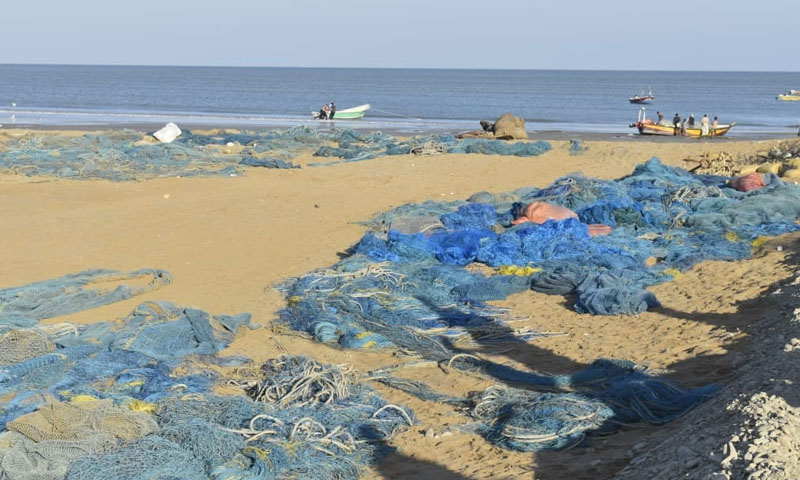- Web
- Feb 15, 2026
Oil smuggling, plastic pollution threaten rare marine life in Balochistan
-

- Web Desk
- Nov 28, 2025

QUETTA: Increasing pollution along the coastal belt of Balochistan has put marine life under severe threat. Incidents dead dolphins, green turtles and other rare sea species washing ashore have risen significantly in recent weeks.
Marine and environmental experts attributed the deteriorating situation to waste dumping, the use of banned fishing nets, illegal trawling and oil smuggling from Iran through sea routes.
Pakistan lies in the northern Arabian Sea with nearly 1,000 kilometres of coastline, most of which falls in Balochistan.
Once considered rich natural nurseries, coastal towns such as Gwadar, Jiwani, Ormara and Pasni were home to large populations of dolphins, whales, green turtles, shrimps and other rare marine creatures. However, rising pollution, illegal trawling, the spread of plastic nets and oil spills linked to Iranian fuel smuggling have severely damaged the region.
Recently, an endangered Indo-Pacific finless porpoise was found dead between Gwadar and Ormara.
Earlier, in November 2023, a 43-foot blue whale was discovered lifeless near Pasni, while the deaths of green turtles have become increasingly frequent.
Oil Smuggling Severely Damaging Marine Ecosystems, Mangroves
Gwadar Development Authority Deputy Director Environment Abdul Rahim Baloch said that Balochistan’s coastline is becoming increasingly unsafe for rare marine species.
According to him, deaths of dolphins, porpoises and turtles have risen by 15 to 20 per cent.
Each year, between 40 and 50 rare turtles and 15 to 20 dolphins are found dead along the shores of Gwadar, Ormara, Pasni and Jiwani, he said.
He said that apart from waste and banned nets, oil smuggling from Iran is one of the major contributors to pollution.

Around 70 kilometres from Gwadar lies Jiwani’s coastal strip, Kuntani Hor, where millions of litres of smuggled Iranian diesel and petrol arrive daily via small boats.
Due to high tides, accidents or fear of being intercepted during naval patrols, fuel containers are often dumped into the sea. A considerable amount also leaks into the water and soil while fuel is transferred to underground storage tanks on shore, severely damaging marine biodiversity and mangrove forests.
Abdul Rahim said mangrove branches are turning black due to repeated oil exposure, threatening their survival. Mangroves not only serve as breeding grounds for marine species but also help protect coastal settlements from high tides and tsunamis.
A government report from April 2024 noted that until 2023, as much as 2.6 million litres of Iranian fuel per day was entering Pakistan via this sea route. Although the volume has reduced due to enforcement actions, millions of litres still enter daily.
According to the US Department of Energy, Iran produces four million barrels of oil per day, making it the world’s eighth-largest oil producer, while Pakistan produces only 100,000 barrels daily. The vast price difference incentivizes smuggling to Pakistan.
Oil Smuggling and Threats to Green Turtle Habitats
Despite restrictions, thousands in border regions still rely on Iranian fuel smuggling for livelihood.
A resident from Kuntani Hor, speaking on condition of anonymity, said that previously 1,200–1,300 speedboats arrived each day, a number now reduced to around 600 — but each carrying 1,500 to 2,000 litres. This means 10 to 12 million litres of fuel still reach Pakistan daily via sea routes.
He said that Jiwani is the shortest route, with boats covering the distance from Iran in 30 minutes. Fuel is stored in hundreds of underground tanks along the coast and then transported on motorcycles to nearby towns.
Spillage is common throughout the process. Sometimes, when Iranian forces chase the boats, smugglers throw fuel-filled jerry cans into the sea to speed up escape.

A joint study (2021) by Muhammad Moazzam Khan, Sudhir Ahmed and Ghulam Nabi of the Balochistan Fishermen Workers Union reported that fuel-smuggling activities have severely degraded green turtle nesting grounds.
WWF Pakistan Technical Advisor and marine life expert Muhammad Moazzam Khan told Urdu News that the region once provided ideal nesting conditions for green turtles, with the only threats coming from stray dogs, jackals and foxes that dug up eggs. But now, heavy use of this route for smuggling has introduced a new level of ecological danger.
He said loose or faulty caps cause fuel leakage when fuel is transferred from boats to trucks. Dark fuel stains are visible on the sand, and the coastline is permeated with the smell of oil.
The study also found that repeated human movement during fuel transfer has compacted beach sand, crushing turtle nests and killing hatchlings. Hardened sand lowers the success rate of egg hatching and makes nest concealment difficult.
Moazzam Khan added that genetic abnormalities have been observed in hatchlings from affected areas, leading to increased mortality.
More Garbage in Jiwani Than Karachi
Jiwani was once celebrated for its serene and beautiful coastline, with some beaches classified as biodiversity hotspots. Its most significant shore lies northwest of the town along rocky dunes.
Moazzam Khan says this rocky coastline hosts rare organisms found nowhere else — including feather stars, pearl oysters and soft-coral species.
He noted slight improvement in Gwadar due to efforts by the municipal committee, but warned that garbage levels in remote and low-population regions like Jiwani now exceed those of Karachi. Most waste is plastic, which is deadly for marine life.
Pollution is also driven by banned nets discarded into the sea, where marine animals become entangled and die.
According to Abdul Rahim Baloch, banned nets are mostly used by illegal fishermen arriving on large trawlers from Sindh. They are not permitted to fish here, yet continue to operate, leading to the deaths of rare sea species.
Despite Gwadar’s significance as the centre of the China-Pakistan Economic Corridor (CPEC), there is no adequate waste management system. Baloch admits there is no organized garbage disposal mechanism in Balochistan’s coastal areas.
Around 400–500 kilograms of waste is dumped daily in open grounds in Gwadar, he says, with no recycling or treatment facilities. Industrial discharge is minimal — most pollution stems from unmanaged public waste.
He said there are no landfill sites and even some government teams dump waste near the shoreline. Conditions in Gwadar have slightly improved, where the Development Authority and the Municipal Committee are carrying out cleaning operations. Two sewage treatment plants are recycling wastewater for irrigation purposes, but the absence of landfill sites continues to worsen the waste problem.
He added that work is under way in Gwadar on a Smart Environment Sanitation System with the support of the federal government, which includes waste collection, landfill sites and recycling plants.
According to him, once the project is completed, it will help reduce pollution along the coastal belt.
Experts say that to curb pollution, coastal communities, the fishing sector and local authorities must work together to establish an effective waste disposal system, prevent illegal trawling and stop fuel leakage. Without timely measures, Balochistan’s coastline may lose its ecological heritage in the coming years.




